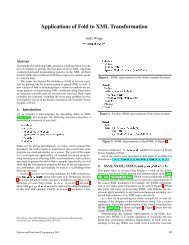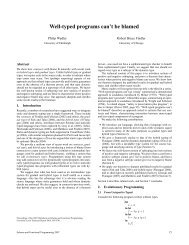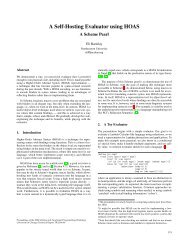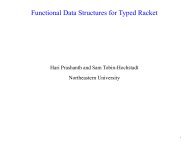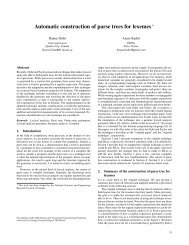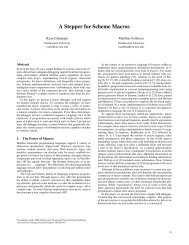2006 Scheme and Functional Programming Papers, University of
2006 Scheme and Functional Programming Papers, University of
2006 Scheme and Functional Programming Papers, University of
You also want an ePaper? Increase the reach of your titles
YUMPU automatically turns print PDFs into web optimized ePapers that Google loves.
As might be expected, we could use plusl ∗o to define the<br />
relations minusl ∗o <strong>and</strong> positive-minusl ∗o .<br />
Here is positive ∗o , another pseudo-variadic relation that<br />
cannot be defined using foldr o or foldl o ; this is because<br />
positive ∗o takes only one argument.<br />
(define positive ∗o<br />
(lambda (in ∗ )<br />
(cond e<br />
((≡ () in ∗ ))<br />
((fresh (a d)<br />
(≡ (a d) in ∗ )<br />
(positive o a)<br />
(positive ∗o d))))))<br />
(run 5 (q) (positive ∗o q)) ⇒<br />
(()<br />
( 0<br />
+1)<br />
( 0<br />
+1 1<br />
+1)<br />
( 0<br />
+1 1<br />
+1 2<br />
+1)<br />
( 0<br />
+1 1<br />
+1 2<br />
+1 3<br />
+1))<br />
4. Double-Pseudo-Variadic Relations<br />
A pseudo-variadic relation takes a list, or a variable representing<br />
a list, as its first argument; a double-pseudo-variadic<br />
relation takes a list <strong>of</strong> lists, or a variable representing a list <strong>of</strong><br />
lists, as its first argument. Let us define plusr ∗∗o , the doublepseudo-variadic<br />
version <strong>of</strong> plusr ∗o . We define plusr ∗∗o using<br />
the foldr ∗o relational abstraction.<br />
(define foldr ∗o<br />
(lambda (rel o )<br />
(lambda (base-value)<br />
(letrec ((foldr ∗o (lambda (in ∗∗ out)<br />
(cond e<br />
((≡ () in ∗∗ ) (≡ base-value out))<br />
((fresh (dd)<br />
(≡ (() dd) in ∗∗ )<br />
(foldr ∗o dd out)))<br />
((fresh (a d dd res)<br />
(≡ ((a d) dd) in ∗∗ )<br />
(rel o a res out)<br />
(foldr ∗o (d dd) res)))))))<br />
foldr ∗o ))))<br />
(define plusr ∗∗o ((foldr ∗o plus o ) 0))<br />
As with plusr ∗o , we can use plusr ∗∗o to add three, four,<br />
<strong>and</strong> two.<br />
(run ∗ (q) (plusr ∗∗o ((3 4 2)) q)) ⇒ (9)<br />
plusr ∗∗o allows us to add three, four, <strong>and</strong> two in more<br />
than one way, by partitioning the list <strong>of</strong> numbers to be added<br />
into various sublists, which can include the empty list.<br />
(run ∗ (q) (plusr ∗∗o (() (3 4) () (2)) q)) ⇒ (9)<br />
In the previous section we used plusr ∗o to generate lists <strong>of</strong><br />
numbers whose sum is five; here we use plusr ∗∗o to generate<br />
lists <strong>of</strong> numbers whose sum is three.<br />
(run 10 (q) (plusr ∗∗o (q) 3)) ⇒<br />
((3)<br />
(3 0)<br />
(3 0 0)<br />
(0 3)<br />
(1 2)<br />
(2 1)<br />
(3 0 0 0)<br />
(3 0 0 0 0)<br />
(0 3 0)<br />
(1 2 0))<br />
There are infinitely many such lists, since each list can<br />
contain an arbitrary number <strong>of</strong> zeros.<br />
As we did with plusr ∗o , let us use plusr ∗∗o to prove that<br />
there is no sequence <strong>of</strong> numbers that begins with five whose<br />
sum is three.<br />
(run 1 (q) (plusr ∗∗o ((5) q) 3)) ⇒ ()<br />
This expression terminates because plusr ∗∗o calls<br />
(plus o 5 res 3), which immediately fails.<br />
Swapping the positions <strong>of</strong> the fresh variable q <strong>and</strong> the<br />
list containing five yields the expression<br />
(run 1 (q) (plusr ∗∗o (q (5)) 3))<br />
which diverges. q represents a list <strong>of</strong> numbers—since each<br />
list can contain arbitrarily many zeros, there are infinitely<br />
many such lists whose sum is less than or equal to three.<br />
For each such list, plusr ∗∗o sums the numbers in the list,<br />
<strong>and</strong> then adds five to that sum; this fails, <strong>of</strong> course, since<br />
the new sum is greater than three. Since there are infinitely<br />
many lists, <strong>and</strong> therefore infinitely many failures without a<br />
single success, the expression diverges.<br />
If we were to restrict q to a list <strong>of</strong> positive numbers, the<br />
previous expression would terminate.<br />
(define positive-plusr ∗∗o<br />
((foldr ∗o (lambda (a res out)<br />
(fresh ()<br />
(positive o a)<br />
(plus o a res out))))<br />
0))<br />
(run 1 (q) (positive-plusr ∗∗o (q (5)) 3)) ⇒ ()<br />
We can now generate all the lists <strong>of</strong> positive numbers<br />
whose sum is three.<br />
(run ∗ (q) (positive-plusr ∗∗o (q) 3)) ⇒<br />
((3)<br />
(2 1)<br />
(1 2)<br />
(1 1 1))<br />
The following expression returns all lists <strong>of</strong> positive numbers<br />
containing five that sum to eight.<br />
(run ∗ (q)<br />
(fresh (x y)<br />
(positive-plusr ∗∗o (x (5) y) 8)<br />
(appendr ∗o (x (5) y) q))) ⇒<br />
((5 3)<br />
(5 2 1)<br />
(5 1 2)<br />
(5 1 1 1)<br />
(1 5 2)<br />
(1 5 1 1)<br />
(2 5 1)<br />
(1 1 5 1)<br />
(3 5)<br />
(1 2 5)<br />
(2 1 5)<br />
(1 1 1 5))<br />
112 <strong>Scheme</strong> <strong>and</strong> <strong>Functional</strong> <strong>Programming</strong>, <strong>2006</strong>




